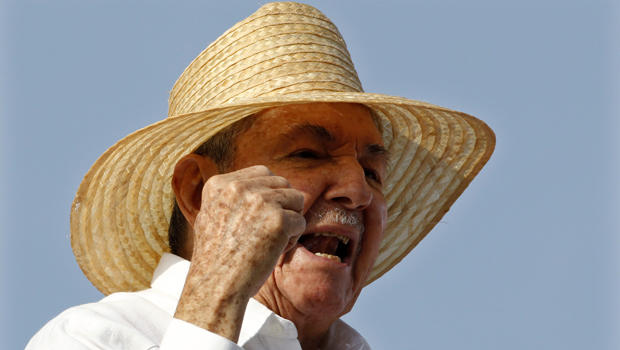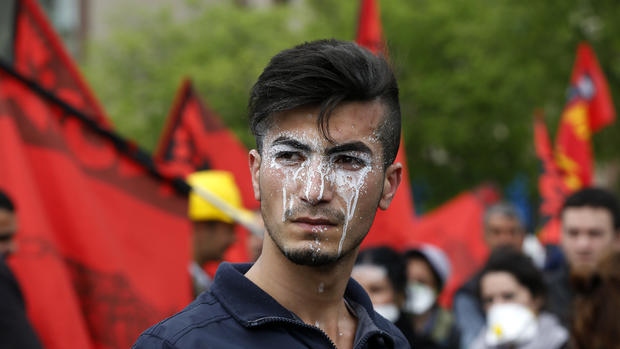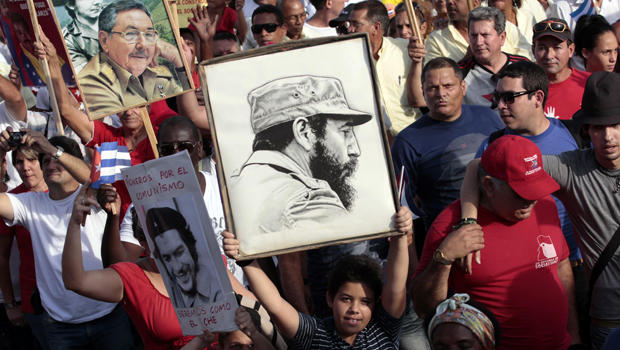Cubans rally for "sustainable socialism" on May Day
HAVANA -- An estimated 600,000 residents of Cuba's capital marched through Revolution Square on May Day morning in an "expression of support for our revolution and our historic leaders," according to top trade unionist Ulises Guilarte De Nacimiento.
Millions more paraded in other cities across the island.
A cheerful-looking President Raul Castro, shielded from the sun by a wide-brimmed straw hat, waved to marchers and chatted with the other top Cuban leaders gathered on the stage.
As usual, the only speaker of the day was the head of the Trade Union Confederation. Guilarte briefly rallied marchers in support of "sustainable socialism," denounced the U.S. economic embargo against the island and voiced backing for Latin American integration, particularly support for the besieged Venezuelan government of Nicolas Maduro.
The newly appointed labor chief, Guilarte is much younger and has more experience in the economic reforms being unrolled by the government than his predecessors.
He was previously Communist Party leader in the province where the new economic zone and deep-water port of Mariel is located and where the first non-agricultural cooperatives were established. Mariel is one of the locations to which Cuba hopes to attract foreign investment as it seeks the resources needed to boost faltering economic growth.
Once the only employer, the government now plans to slash a million workers - 20 percent - from the public payrolls by 2016. So far, only about 10 percent of these jobs have been cut.
The shift of workers into a newly emerging private sector gained speed last year as the government moved to rid itself of non-essential economic activity by promoting cooperatives, self-employment, private businesses and leasing arrangements.
At the same time, the government hopes to increase efficiency and productivity in state-owned enterprises and to increase wages for public employees.
In March, salary increases were announced for 440,000 public health care workers, nearly doubling their income. The export of health care services is the island's most important hard-currency earner and is expected to bring in more than 8.2 billion convertible Cuban pesos (equivalent to the U.S. dollar) this year.
Not surprisingly, health care workers led the May Day parade.
The government does not refer to a private sector but to "non-state" workers, of whom there were more than a million in 2012. Most of these people work in agriculture as the government launched a program encouraging individuals to lease state land and take up farming in an effort to increase food production and reduce costly food imports.
The rest of the private workers numbering a bit over 450,000 by last year are mostly self-employed taxi drivers, photographers, carpenters, electricians, construction workers and hairdressers, or they run small retail businesses, many in the food industry.
One of the odder features of the government's approach is to encourage the owners of small businesses to join trade unions along with their employees. The law governing self-employment allows for the issuing of the same self-employment license to the bosses as it does to the people they hire to work for them, not recognizing conflicts of interest.
Cuba's labor force is also aging. The 2013 Census puts 18.3 percent of the population at over 60 years of age. By 2015, that percentage will rise to 25 percent, and the birthrate is only 1.73 per 1,000 of the population, which is well below the figure needed to replenish the work force.
As in the past, the government ran Thursday's May Day celebration like a military operation with public transportation shuttling marchers from all over the capital to their designated location in the parade.
Posters of Fidel and Raul Castro and of the late Venezuelan leader Hugo Chavez bobbed overhead as in the past, and the rhetoric was as fiery as ever. A palpable enthusiasm and festive air prevailed as worries over increasing job insecurity and the rising cost of living were set aside for a few hours.

